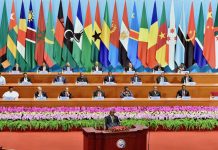Africa-Press – Lesotho. Professor Fatima Denton, Director of the United Nations University-Institute for Natural Resources in Africa (UNU-INRA), has urged people to adopt a more democratic approach to achieving a greener economy.
She noted that as the world shifted to a low-carbon economy and the use of clean energy, democracy would ensure the inclusion diverse voices and viewpoints.
This would create an avenue to hear the concerns of marginalized people and address their needs, ensuring that no one was left behind in the transition process.
“Doing so would ensure equitable and just transitions,” she said.
Professor Denton made the call at the opening of a two-day conference organised by the UNU-INRA in collaboration with Utrecht University and the Prince Claus Chair for Equity and Development.
Under the theme: “Justice for whom? Justice for what? Democratising Just Transitions,” the event included the launch of the Dare to Share Knowledge Platform (DtoSKP) on Just Transitions.
The platform is an initiative to foster broad stakeholder engagements and to promote the inclusion of unheard voices in the pursuit of sustainable development, including food systems, clean energy, and urbanisation.
Prof Denton stated that democratising the transition to greener and more resilient societies also required a change in the world economic system from hegemonic to inclusive.
She said there was a need to identify and make more accessible the transition’s opportunities. Prof. Denton said there was also the need to reduce the heavy emphasis on markets and commodification of nature. She called for the adoption of human-centred and collective approaches to solving the challenges of sustainable development.
At the heart of just transition, she said, was peace, insisting that without peaceful coexistence, it would be difficult to plan and effectively execute the agenda towards a green and sustainable environment.
“Achieving just transition requires us to be more intentional about making it happen,” Prof Denton emphasised.
Dr James Murombedzi, Chief of Climate Change Section, United Nations Economic Commission for Africa, said African countries faced several challenges in their efforts towards just transitions.
He said key among them were limited financial resources, inadequate infrastructure, low level of technology and technical capacity, weak governance and low institutional capacity, and lack of social equity and inclusiveness.
Dr. Murombedzi stated that tackling those difficulties necessitated a multifaceted approach involving collaboration among governments, civil society, private sector actors, and international partners.
It also involved long-term planning, policy coherence, and continuous monitoring and evaluation, he added. As part of the activities for the event, participants were put into groups and made to discuss various cases of unjust transitions.
One group recommended that peace, security, and a stable environment were necessary conditions for a just transition. Another group added that it was essential to include women and youth to cater for their peculiar needs.
The third group called for an enabling environment for African businesses and entrepreneurs to participate in the just transition process. Participants and key speakers for the event came from Ghana, other African countries, The Netherlands, and around the world.
They included representatives from Utrecht University, UNU-INRA, government institutions, development organisations, civil society, energy sector, academia, as well as green entrepreneurs and campaigners.
For More News And Analysis About Lesotho Follow Africa-Press






